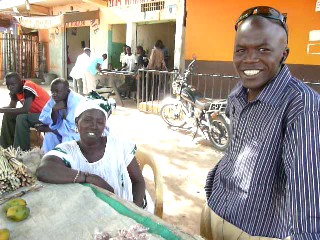Won’t You Be My Neighbor…And Give Me a Good Credit Rating
April 29, 2009

"Tea"
Over tiny cups of scalding, frothy sugar water that Senegalese people call “tea,” I have a chance daily to sit around with my fellow MFI employees and talk microfinance. The other day, I was sipping my tea with Moussa, a loan officer, and he told me about how credit is established in Senegal. Now, in America, a credit rating is a logical thing, based on the percent of your total credit you’re using, the type, duration and size of your credits, and your delinquent payments. In Senegal, it’s done a bit differently…
Kiva Fellow: So, Moussa, in America, every person has a credit rating, which is based on a formula and makes it easy to estimate how likely it is that they will repay a loan. Does that kind of thing exist here?
Moussa: (Laughing.) No…Your country is a lot more advanced than ours. We don’t have the ability to do that kind of thing here.
KF: Ok, so how do you decide whether or not to give someone a loan? I know the person has to have a savings account with IMCEC, and they have to provide certain things as collateral or have another person to pledge to back them up if they don’t repay. But is there anything that helps establish credit-worthiness? [This conversation was in French, and I’m being very kind to myself in the eloquence of my translations. I sound a lot more like a 5-year-old.]
Moussa: Well, first of all, we can look at their history with IMCEC. Sometimes we start by giving a smaller loan, and if they repay it well, their second and third loans can be larger. Then we look at the business plan to see if it looks profitable. But, we also talk to people who know the client to see what they have to say.

Moussa, IMCEC Loan Officer, with a Kiva Borrower
KF: You mean, you go to their neighbor’s house and ask them if the client is a good guy?
Moussa: Yeah, basically. I mean, we wait until the client isn’t around before we talk about him.
KF: That’s nice of you. And what if the neighbor just happens not to like the guy? What if the neighbor is actually the one who isn’t a good guy?
Moussa: Yeah, that can happen. Which is why we talk to more than one person. For example, say there is a store in the neighborhood where everyone goes to buy basic items like soap and sugar. The owner of that store usually sells things on credit at the end of the month when people are running out of money. We can ask the store owner for some information on the client – does he repay these purchases on time? We also try to have at least one person on the Loan Committee from each neighborhood to get another perspective on the clients.
KF: Wow. So it really pays to be nice to your neighbors! And you loan officers really need to know everyone in town!
Moussa: Yep!
***
It’s pretty incredible to me that the system works this way, or, more specifically, that the system actually does seem to work this way. With a write-off ratio of less than 1% of all loans, IMCEC seems to be doing pretty well. Maybe American banks should have considered the “neighborhood” aspect of credit – for all its imperfections, the Senegalese way of evaluating creditworthiness might provide a more meaningful and accurate perspective than the impartial, formulaic system we use.
Furthermore, in conclusion, next time you live in Thies, Senegal, and you feel tempted to throw a wild party and annoy all your neighbors with the noise, think twice. Afterwards, you may mysteriously be rejected for every microloan you apply for.
That is, of course, unless you invite them all to your party and give them free food and drink. Just imagine how the credit will flow then!
***

I am a Kiva Fellow, Class of KF6/7, serving three months in Lome, Togo, and three more in Thies, Senegal. Please check out my current MFI, IMCEC, and see all of their fundraising loans here!
/>













